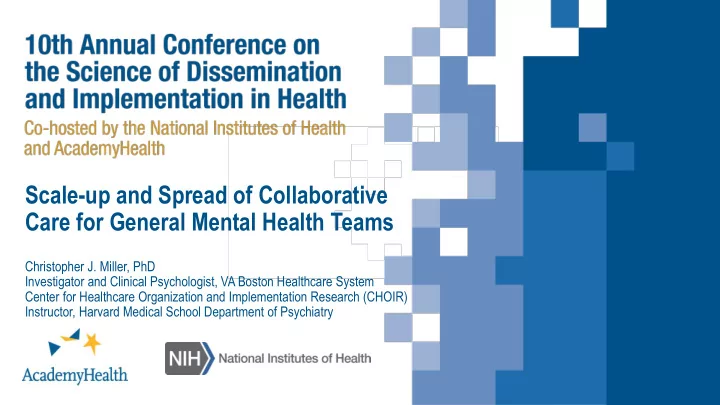

1 Scale-up and Spread of Collaborative Care for General Mental Health Teams Christopher J. Miller, PhD Investigator and Clinical Psychologist, VA Boston Healthcare System Center for Healthcare Organization and Implementation Research (CHOIR) Instructor, Harvard Medical School Department of Psychiatry
Outline 2 • The Collaborative Care Model (CCM – the evidence-based practice we are trying to sustain/spread) • Project background • Recent implementation trial in VA outpatient mental health teams • Spread and sustainability efforts at the program level • Recent/current • Forthcoming • Lessons learned
The Collaborative Care Model (CCM) 3 • Evidence-based way to structure care for chronic conditions (Wagner, Von Korff, et al.) • Originally developed in 1990’s: chronic health issues (e.g. diabetes) • “Principles, not prescriptions” • Recent reviews: effectiveness in RCT’s extends to mental health (e.g. depression, anxiety, bipolar) Wagner et al., 1996 Woltmann et al., 2012; Miller et al., 2013
The Collaborative Care Model (CCM) 4 • Overall goal: more anticipatory, continuous, collaborative, evidence- based care via: • Workrole redesign • Patient self-management support • Provider decision support • Information management • Linkages to community resources • All supported by close ties to hospital and clinic leadership
Project Background 5 • 2013-14: Pilot study to help one outpatient general mental health team adopt principles of the Collaborative Care Model (CCM) • 2015-18: Implementation trial : nine additional teams • 2017- ? : Efforts to sustain and spread CCM-based care to teams in remaining VA medical centers
Recent Implementation Trial: 6 the BHIP Enhancement Project • Goal: help VA’s Behavioral Health Interdisciplinary Program teams ( BHIPs ) adopt CCM – general outpatient mental health • Trial design details: 12/6 @ 8:15am in Salon F/G/H • Protocol paper: Bauer et al., 2016 in Implementation Science • Intervention: blended facilitation (internal and external) • Hypotheses: Facilitation CCM-ness improved outcomes • Veteran, provider, system
Recent Implementation Trial: 7 the BHIP Enhancement Project • Built around the BHIP-CCM Enhancement Guide • Walk teams through CCM-oriented processes: – CCM Considerations/Examples – Questions for Self-Assessment – Common Challenges • Current status: finalizing data collection (~March 2018)
Programmatic Spread and Sustainability Efforts: 8 Recent/Current • 2016: VA’s Office of Mental Health and Suicide Prevention (OMHSP) request to offer facilitation support to additional, interested teams nationwide • How to spread/sustain on limited budget? • How to decide who receives facilitation support? • How to identify facilitators?
Programmatic Spread and Sustainability Efforts: 9 Original Plan Developed two-day curriculum + ongoing ~100% facilities consultation support to ~66% facilities implement train new external BHIP-CCM by implement facilitators EOFY19 BHIP-CCM by EOFY18 ~33% facilities implement BHIP-CCM by EOFY17 F2F meeting in Boston Sept FY16
Programmatic Spread and Sustainability Efforts: 10 Recent/Current • September, 2016: BHIP Enhancement Project staff train National Transformational Coach Captains ( T-Coach Captains , n = 13) to facilitate adoption of the Guide • National solicitation of program letters of agreement • FY17: 30 additional sites provided support (35 originally enrolled)
Programmatic Spread and Sustainability Efforts: 11 Recent/Current • Structure of Additional Support • OMHSP: Kendra Weaver, PsyD (Senior Consultant) , Tracey Smith, PhD (VISN 16 South Central MIRECC – pivotal project management) • T-Coach Initiative: Dedication of some additional staff time to BHIP spread nationally (all T-Coaches have responsibilities other than BHIP) • VA research staff: Staff with CCM expertise supporting T-Coaches • Sites: Internal Facilitator (~10% FTE) • Limited additional monetary support
Programmatic Spread and Sustainability Efforts: 12 Forthcoming Steps • Disseminate BHIP-CCM Enhancement Guide to remaining teams nationally • Multi- level “menu” of support: Implementation Support Component Level 1 Level 2 Level 3 Level 4 Receipt of the BHIP-CCM Enhancement x x x x Guide Enrollment of key BHIP leaders in x x x facilitator groups Baseline site assessment + virtual site visit x x 12-month External Facilitation x
Programmatic Spread and Sustainability Efforts: 13 Current Plan Developed two-day curriculum + ongoing consultation support to train T-Coach Captains Remaining facilities ~25% of offered Guide facilities and menu of receive support facilitation options by support by F2F meeting EOFY18 EOFY17 in Boston (30 teams) Sept FY16
Programmatic Spread and Sustainability Efforts: 14 Lessons Learned • Importance of partners who are invested • Connections to national priorities (OMHSP) • Person-power for ongoing facilitation (T-Coach Initiative) • Importance of realistic expectations • Full 12 months of facilitation support across each medical center menu approach with lighter touch as the norm
Programmatic Spread and Sustainability Efforts: 15 Lessons Learned • Importance of flexibility in the face of shifting priorities and resources • National: employee experience access, suicide prevention, efficiency • Increased travel restrictions switch to virtual site visit • Local: evaluation metrics – not all teams can commit to full 12 months of facilitation support • Menu approach: match support to need
Summary 16 • Sustaining and spreading programs at the national level = challenging • Requires investment from operational partners, careful matching of offers to available resources • Importance of flexibility in the face of changing demands at national and local levels • If done well: lasting system change
17 THANK YOU! • Christopher J. Miller, PhD – christopher.miller8@va.gov • VA Boston Healthcare System (CHOIR) • Harvard Medical School Department of Psychiatry • Funding support: VA HSR&D QUERI 15-289 • Institutional support: Behavioral Health QUERI, OMHSP @christojoe1979 @VA_CHOIR
Recommend
More recommend